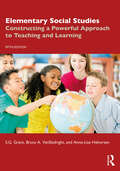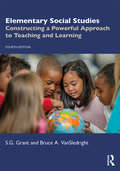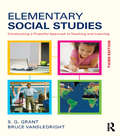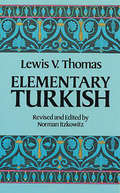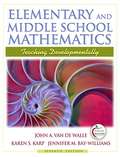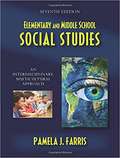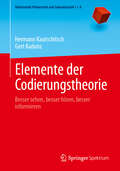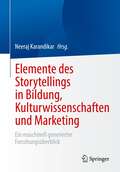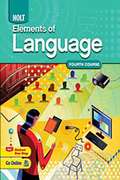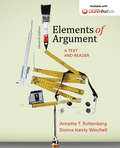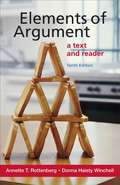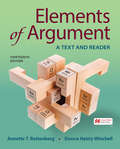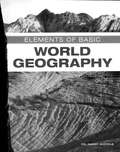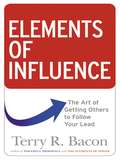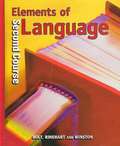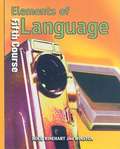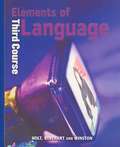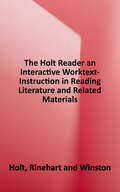- Table View
- List View
Elementary Social Studies: Constructing a Powerful Approach to Teaching and Learning
by Bruce A. VanSledright S.G. Grant Anne-Lise HalvorsenThe fully updated fifth edition of Elementary Social Studies provides a rich and ambitious framework to help social studies teachers achieve powerful teaching and learning results. Organized around four commonplaces of education—learners and learning, subject matter, teachers and teaching, and classroom environment—and deeply rooted in inquiry-based teaching and learning, this book deeply probes the basic elements of quality instruction—planning, implementation, and assessment—always with the goal of creating and supporting students who are motivated, engaged, and thoughtful.Book features and updates to the fifth edition include: • New guidance on tackling controversial issues in the social studies classroom. • Fully revised chapter on creating a genuine learning community, which now addresses socio-emotional learning and family involvement in the classroom. • New perspectives on the importance of teaching for social justice. • Increased attention to the C3 Framework for state social studies standards. • Chapters on using the Inquiry Design Model (IDM) to understand inquiry-based teaching and learning and to develop IDM inquiries. • Real-classroom narratives that introduce chapters and provide in-depth access to teaching and learning contexts. • Practical curriculum and resource suggestions for the social studies classroom. • End-of-chapter summaries and annotated teaching resources.By blending the theoretical and the practical, this book is essential reading for pre-service and in-service social studies teachers.
Elementary Social Studies: Constructing a Powerful Approach to Teaching and Learning
by Bruce A. VanSledright S.G. GrantOrganized around four commonplaces of education—learners and learning, subject matter, teachers and teaching, and classroom environment—Elementary Social Studies provides a rich and ambitious framework to help social studies teachers achieve powerful teaching and learning results. By blending the theoretical and the practical, the authors deeply probe the basic elements of quality instruction—planning, implementation, and assessment—always with the goal of creating and supporting students who are motivated, engaged, and thoughtful. Book features and updates to the fourth edition include: • Two new chapters on using the Inquiry Design Model (IDM) to understand inquiry-based teaching and learning and to develop IDM inquiries. • Revised chapter on ideas and questions. • Revised chapter on literacy to more fully incorporate media literacy and digital citizenship. • Real-classroom narratives introduce chapters and provide in-depth access to teaching and learning contexts. • Practical curriculum and resource suggestions for the social studies classroom. • End-of-chapter summaries and annotated teaching resources.
Elementary Social Studies: Constructing a Powerful Approach to Teaching and Learning
by Bruce A. Vansledright S. G. GrantOrganized around four commonplaces of education--learners and learning, subject matter, teachers and teaching, and classroom environment--Elementary Social Studies provides a rich and ambitious framework to help social studies teachers achieve powerful teaching and learning results. By blending the theoretical and the practical, the authors deeply probe the basic elements of quality instruction--planning, implementation, and assessment--always with the goal of creating and supporting students who are motivated, engaged, and thoughtful. Book features and updates to the third edition include: * New chapter on classroom assessment that outlines and compares existing assessment strategies, contextualizes them within the framework of state standards, and articulates a constructivist approach that moves away from traditional high-stakes testing towards more meaningful ways of evaluating student learning * New chapter that highlights and explains key elements of the Common Core State Standards for English Language Arts, and shows how the incorporation of critical ELA instruction into the social studies curriculum can foster more ambitious teaching and learning * Real-classroom narratives that introduce each chapter and provide in-depth access to teaching and learning contexts * Practical curriculum and resource suggestions for the social studies classroom * End-of-chapter summaries and annotated teaching resources
Elementary Statistics: A Student Workbook for an Introduction to Statistics
by J EitelThis is the workbook portion of a course in Elementary Statistics. It is accompanied by web based lecture material. Together they from a course in College Statistics.
Elementary Turkish (Dover Language Guides)
by Lewis ThomasTurkish is the primary language of some thirty million people. Anyone concerned with current social, political, and cultural developments in Turkey knows that a practical understanding of the basic patterns of modern Turkish is an invaluable skill that until now has been difficult to attain without extensive training.This superb grammar and exercise text, used successfully for years in Princeton University, enables English-speaking students — in and out of the classroom — to gain a quick and thorough understanding of modern Turkish. In a carefully arranged sequence of 23 lessons, Lewis V. Thomas, late Professor of Oriental Studies at Princeton, presents thorough coverage that allows the student to begin to use the basic patterns of modern Turkish without time-consuming and expensive private instruction.The method of instruction was devised after an extensive analysis of results in Princeton classrooms, and relies on exercises at the end of each lesson to test the student's grasp of the material. Beginning with the alphabet and numbers, Professor Thomas offers clear, concise coverage of articles, adjectives and nouns, common infinitives, personal pronouns, and elementary verbs. As the student's comprehension of basic elements develops, further lessons deal with more complicated subjects such as the possessive construction, past general verbs, postpositions, the partitive, progressive verb forms, and abbreviating verb forms. A complete Turkish-English glossary translates new vocabulary occurring in the exercises.Norman Itzkowitz, Professor of Near Eastern Studies at Princeton University, has skillfully made the necessary revisions and additions to complete Professor Thomas' work. For anyone who needs to communicate in this important and influential language, Professor Thomas' proven course, now in an inexpensive paperback edition, is the most effective method available.
Elementary and Middle School Mathematics: Teaching Developmentally
by John A. Van de Walle Karen S. Karp Jennifer M. Bay Williams"It is fun to figure out the puzzle of how children go about making sense of mathematics and then how to help teachers help kids. " John A. Van de Walle, Late of Virginia Commonwealth University This is the philosophy behindElementary and Middle School Mathematics: Teaching Developmentally. John A. Van de Walle wrote this book to help students understand mathematics and become confident in their ability to teach the subject to children in kindergarten through eighth grade. Although he could not have foreseen the changes in mathematics teaching over the last three decades, he was at the forefront of the movement towards a constructivist view of teaching, or teaching developmentally. Constructivism says that children construct their own knowledge. They are not blank slates waiting to absorb whatever the teacher tells them. Teachers must understand both mathematics itself and how students learn mathematics in order to teach it effectively. Learning through problem solving is another major theme of this book. Students solve problems not just to apply mathematics, but also to learn new mathematics. Effective problems will take into account where students are, the problematic or engaging aspect of the problem must be due to the mathematics that the students are to learn and not be diluted by non-mathematical activities such as cutting or pasting, and the problem must require justifications and explanations for answers and methods. Learning then becomes an outcome of the problem solving process. The book also addresses in more detail than any other book on the market the effect that the trends of standards-based education, increased pressure to test, and increased teacher accountability have had on teaching mathematics. He addresses the 2000 NCTM Standards in depth, in Chapter 1 on Teaching Mathematics in the Era of the NCTM Standards, through the NCTM icon that appears in the margins throughout the text, and in two appendices in the back of the book. Chapter 5 on Building Assessment into Instruction has also been heavily revised to focus on increased testing pressure, creating more explicit links between objectives and assessment, and including assessments for students with special needs. Elementary and Middle School Mathematics: Teaching Developmentallyis a book for doing math today-for both students who want to become teachers, and the students they will eventually teach. New To This Edition: NEW! Revises Chapter 5 on assessment--Discusses increased testing pressure and accountability, adds more information on equitable assessments, creates more explicit links between objectives and assessment, and includes assessments for students with special needs. NEW! Updates theLiterature Connectionsfeature to remove all out of print children's literature and include more non-fiction, poetry, and other types of readings. NEW! Weaves theFocal Pointsthroughout the chapters as well as links them with theBig Ideasfeature-Focal Pointshave also been added to the Appendix. NEW! Includes expanded coverage of working with diverse learners. NEW! Gives greater emphasis on dealing with math anxiety.
Elementary and Middle School Social Studies: An Interdisciplinary, Multicultural Approach
by Pamela J. FarrisThe latest edition of Pamela Farris's popular, value-priced text continues to offer pre- and in-service teachers creative strategies and proven techniques sensitive to the needs of all elementary and middle school learners. Coverage includes the C3 Framework and the four sets of learning from the National Curriculum Standards for Social Studies. Farris, together with contributors who specialize in implementing successful teaching methods and theories, demonstrate how classroom teachers can excite and inspire their students to be engaged learners.
Elemente der Codierungstheorie: Besser sehen, besser hören, besser informieren (Mathematik Primarstufe und Sekundarstufe I + II)
by Gert Kadunz Hermann KautschitschIm täglichen Leben sind wir zunehmend von Codes umgeben, die mathematisch konstruiert werden. Sie sind teils leicht erkennbar (Strichcode, ISBN, IBAN, QR) und teils eher verborgen (GPS, WLAN, CD, DVD). In diesem Buch werden solche Codes vorgestellt. Es wird dargelegt, wie sie aufgebaut sind, wie sie funktionieren und welche Mathematik zu ihrer Entwicklung und Anwendung notwendig ist. Die Lesenden lernen, eigenhändig Codes zu erstellen, Fehler zu erkennen und zu korrigieren:EAN, ISBN und deren Barcodedarstellung sowie die internationale Bankkontonummer IBAN werden erarbeitet.Kleine QR-Codes werden mit den vorgestellten Methoden (Paritätsprüfung, Linearcode, Polynomcode, zyklischer Code und Reed-Solomon Code) anschaulich realisiert.An der Herstellung einer Mini-CD mit einem CIRC-Code über einem kleinen Körper werden wesentliche Konstruktionsprinzipien von neuen Codes aus bestehenden Codes, wie z.B. Kürzen, Erweitern, Spreizen (Interleaving) und gekreuztes Spreizen (Cross-Interleaving) veranschaulicht.Das Verstehen von Mathematik wird durch diese selbstständige Erstellung und Verwendung didaktisch maßgeschneiderter Codes wesentlich gefördert.Ein besonderer Fokus des Buchs liegt auf elementaren Methoden des Rechnens mit ganzen Zahlen und Polynomen. Für diese benötigt man nur den Satz von der Division mit Rest als zentrale Aussage – daher können große Abschnitte bereits mit Lernenden der Sekundarstufe II erarbeitet und die Grundlagen wesentlicher Teile der Codierungstheorie von den Lernenden mathematisch korrekt erfasst werden. Für Ausführungen, zu deren Verständnis Kenntnisse notwendig sind, die über die Mathematik der Sekundarstufe II hinausgehen, liegt ein ausführlicher Anhang vor (Vektorräume, Matrizen, Rechnen in endlichen Körpern).
Elemente des Storytellings in Bildung, Kulturwissenschaften und Marketing: Ein maschinell generierter Forschungsüberblick
by Neeraj KarandikarDieses Buch ist ein maschinell generierter Überblick über den Einsatz von Storytelling-Elementen in den Bereichen Bildung, Kultur und Marketing. Das Buch gibt einen Einblick, wie sich das Erzählen von Geschichten mit verschiedenen menschlichen Aktivitäten überschneidet und diese beeinflusst. Diese AI-gestützte Zusammenstellung von Forschungsarbeiten ist eine nützliche Ressource für alle Leser, die sich für die Interaktion von Storytelling mit den oben genannten Themen interessieren.
Elements Of Language: Grammar, Usage and Mechanics - Language Skills Practice for Chapters 10-26
by Holt Rinehart Winston StaffMost of the worksheets you will find in this workbook are traditional worksheets providing practice and reinforcement activities on every rule and on all major instructional topics in the grammar, usage, and mechanics chapters in Elements of Language.
Elements of Argument
by Annette T. Rottenberg Donna Haisty WinchellPACKAGE THIS TITLE WITH OUR 2016 MLA SUPPLEMENT, Documenting Sources in MLA Style (package ISBN-13: 9781319084639). Get the most recent updates on MLA citation in a convenient, 40-page resource based on The MLA Handbook, 8th Edition, with plenty of models. Browse our catalog or contact your representative for a full listing of updated titles and packages, or to request a custom ISBN. Elements of Argument combines a thorough argument text on critical thinking, reading, writing, and research with an extensive reader on both current and timeless controversial issues. It presents everything students need to analyze, research, and write arguments. Elements of Argument covers Toulmin, Aristotelian, and Rogerian models of argument and has been thoroughly updated with current selections students will want to read. With three-quarters of the readings new to this edition (and with additional multimodal selections available online), expanded coverage of key rhetorical issues, reorganized research chapters, and a fresh design, Elements of Argument is a truly flexible classroom resource. An e-book is available at half the price of the print book. Our newest set of online materials, LaunchPad Solo, provides all the key tools and course-specific content that you need to teach your class. Get all our great course-specific materials in one fully customizable space online; then assign and mix our resources with yours. To package LaunchPad Solo free with Elements of Argument, Eleventh Edition, use 978-1-319-01079-9.
Elements of Argument: A Text And Reader (Tenth Edition)
by Annette T. Rottenberg Donna Haisty WinchellElements of Argument combines a thorough argument text on critical thinking, reading, writing, and research with an extensive reader on both current and timeless controversial issues. It presents everything students need to analyze, research, and write arguments. Elements of Argument covers Toulmin, Aristotelian, and Rogerian models of argument and has been thoroughly updated with current selections students will want to read. It now includes additional support for academic writing, making it a truly flexible classroom resource. An electronic edition is available at half the price of the print book. Read the preface.
Elements of Argument: A Text and Reader
by Annette Rottenberg Donna WinchellWith Elements of Argument you get two books in one: an argument text and a reader focused on the issues you care about. In addition you’ll find lots of support to help you understand the components of argument in order to build your own compelling essays. And if you’re writing a research paper, you’ll appreciate the guidance on evaluating sources for bias and the sample essays that model effective use of digital sources.
Elements of Basic World Geography
by Nancy NicholsElements of Basic World Geography by Nancy Nichols
Elements of Influence: The Art of Getting Others to Follow Your Lead
by Terry BaconDrawing on twenty years of research on the most common positive and negative influencing techniques people use to get ahead, author Terry R. Bacon explains how influence works and how you can use it to lead effectively and reach any goal.We succeed when we&’re able to influence how others think, feel, and act: getting them to accept our point of view, follow our lead, join our cause, feel our excitement, or buy our products and services. By shedding light on how the act of influencing impacts our daily lives--even when we don&’t realize we (or others) are doing it--Elements of Influence offers the key to using this tool more consciously and effectively through adaptability, perceptiveness, and insight.Whether you&’re a business leader, frontline employee, entrepreneur, or stay-at-home parent, this universal resource teaches you:why people allow themselves to be influenced and why they resist;how to choose the right influencing approach in different situations;how to be influential without formal authority;and what it takes to achieve success in every kind of organization or professional role--even when working with those from other countries and cultures.Filled with tips, exercises, and practical applications, Elements of Influence shows how anyone can exert influence to achieve real results.
Elements of Language, Second Course
by Lee Odell Judith L. Irvin Renee Hobbs Richard VaccaThis book serves as a useful guide to developing skill as an effective and critical language user--a communicator--in the twenty-first century.
Elements of Language: Fifth Course
by Lee Odell Renee Hobbs Richard VaccaThis book presents a fundamental approach to the teaching and learning of language.
Elements of Language: First Course
by Lee Odell Richard Vacca Renée Hobbs Judith IrvinElements of Language can be an important resource by helping you use language more effectively as you communicate in the twenty-first century.
Elements of Language: Introductory Course
by Lee Odell Judith L. Irvin Renee Hobbs Richard VaccaThe book "Elements of Language" is an important resource by helping students use language more effectively as they communicate in the twenty-first century.
Elements of Language: Language Skills Practice
by Holt Rinehart WinstonThe Language in Context worksheets include Choices worksheets, Proofreading Applications, Literary Model Worksheets, and Writing Applications to guide students throughout their English lessons.
Elements of Language: Language Skills Practice for Chapters 10-24 (Grade #6)
by Holt Rinehart WinstonHere's your chance to step out of the grammar book and into the real world. You may not notice parts of sentences, but you and the people around you use them every day. The following activities challenge you to find a connection between sentences and the world around you. Do the activity below that suits your personality best, and then share your discoveries with your class.
Elements of Language: Sixth Course
by Lee Odell Renee Hobbs Richard VaccaThis book guides to developing your skill as an effective and critical language user-a communicator in the twenty-first century.
Elements of Language: Third Course
by Holt Rinehart WinstonPut the communication strategies in Elements of Language to work by logging on to the Internet. At the Elements of Language Internet site, you can dissect the prose of professional writers, crack the codes of the advertising industry, and find out how your communication skills can help you in the real world.
Elements of Literature, Grade 12: Holt Reader: Interactive Worktext (Elements Of Literature Ser.)
by Holt Rinehart and Winston StaffThe Holt Reader: An Interactive WorkText is a book created especially for you. It is a size that’s easy to carry around. This book actually tells you to write in it, circling, underlining, and jotting down responses to the literature and related materials. In addition to outstanding selections and background information providing the context for these selections, you’ll find graphic organizers that encourage you to think a different way. This is designed to accompany Elements of Literature. Like Elements of Literature, it helps you interact with the literature and background materials. The chart below shows you what’s in the book and how it’s organized.
